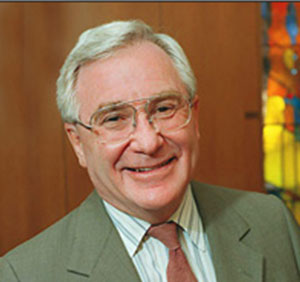

“Theology and medicine can work together,” Dr. Herbert Benson assured 500 persons at the Saturday meeting who packed the pews at St. John’s and overflowed into chairs set up at the front, back and side aisles of the church. Benson, founder and head of the Mind/Body Institute and a pioneer in studying the faith factor in healing, thinks people should think of health and well-being as a “three-legged stool” with each leg supporting the other.
“There is no substitute for good pharmaceuticals. There is no substitute for appropriate surgery. And there is no substitute for belief in what we can do for ourselves in self-care” the cardiologist says. He argues that the “faith factor” is so powerful and so persuasive in the healing practices of culture after culture that it may be part of our biological makeup.
We seem to be “hard-wired” for phobias such as fear of snakes or spiders, and much in wired within us in our experiences and memory, Benson says. “We remember what it was to be well,” he proposes. One of the first medical researchers to study the health benefits of prayer and meditation, Dr. Benson originally studied meditators of the Transcendental Meditation (TM) movement. Research showed that mediation with a mantra resulted in lower blood pressure, slower heart rate and lower metabolic rates. Further study indicated that phrases used by Christians, Jews, and others who prayed regularly were equally effective in stimulating the healthful physiological changes in the body Dr. Benson called the “relaxation response”.
It is time, he believes, to bring together the ancient healing traditions of spiritual healing and the tradition of medicine. “We know pretty well how to do healing at our place (the Mind/Body Institute). We want to find out how to reach out to the diversity of the community.”
The potential for such outreach was demonstrated in Dr. Benson’s audience at St. John’s. It included physicians; psychologists; psychotherapists; hospital executives; physical, occupational and massage therapists; nutritionists, hospice and hospital chaplains; representatives from Christian, Jewish, Hindu and Muslim faiths as well as a Zen practitioner and Chinese herbalists. All had responded to news of the meeting spread by word of mouth, a few newspaper announcements and some well-placed flyers.
The Pilgrimage and the Mind/Body Medical Institute will engage jointly in the training of physicians and clergy in the laying on of hands and the use of meditation and prayer in self-healing through eliciting the relaxation response.
The Rev. Tanya Beck is completing her tenure as interim rector of St.John’s and will soon take over The Pilgrimage as a full-time job. “I’m a very blessed person,” she says. “Imagine a 64-year old woman getting a whole new ministry to take her into the next century.”
There are three Pilgrimage Gatherings still on her schedule, and the continuing healing touch done for five to seven people a day by 14 volunteer healing teams at St. John’s. Now the collaboration with the Mind/Body Institute will begin with a blind study proposed involving 600 persons. Three hundred of these will be prayed for by people who will be told only the first names of the two or three persons for whom they will pray.
These “non-local” prayers will be done here, by persons who pray regularly—Daughters of the King being one example. Prayers will be directed to those with such illnesses as chronic fatigue syndrome, cancer, heart ailments, insomnia, and total stress. Other subjects in the study may have had operations which are not healing well. Tanya Beck says prayers in a peaceful, prayerful environment that focus energy back to the core where God resides can also benefit those who are healthy, giving them a “jump start” for the rest of the week.
By JEANETTE FORGIE CRANE